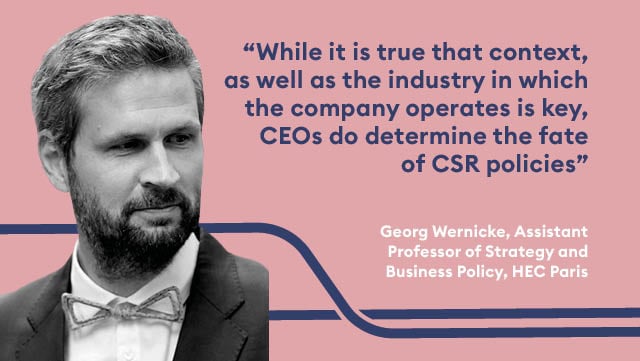CEOs hold significant sway over the success of policies — especially CSR initiatives, writes Georg Wernicke.
The behaviour of companies has never been as scrutinised as it is today. Investors, consumers, regulators and employees alike, check and double check business' attitudes towards their communities, their staff and the planet, and demand transparency and a full commitment to sustainability and ethics.
Current and future employees value purpose and meaning in their work
In management, current and future employees see employment as an extension of their own lifestyles and values, and demand that the businesses they work for reflect these values. This is true for millennials and subsequent generations. In this context, companies that want to attract and retain the best talent, and remain competitive, have to make sure they are complying with those demands by actively guaranteeing a competitive and ambitious Corporate Social Responsibility (CSR) strategy. The question remains how to make this strategy work.
When implementing CSR policies, support must come from the top-down
According to a joint research project I conducted with Miha Sajko and Christophe Boone from the University of Antwerp, firms that want their CSR programs to really succeed and become deeply ingrained in the organisation, need to get involvement and backing from top management. In other words, CEOs are essential drivers of CSR initiatives and the ones who can actually transform them into positive business results.
Why the influence of a CEO can make or break a policy
In our study, we measured the so-called “CEO effect”, which is the influence that CEOs actually have on the concrete actions, behaviours and outcomes of a business. What we found is that CEOs account for a significant 30% variation between the different firms’ CSR behaviours and actions.
Many people tend to think that CEOs are just visible heads of large and complex structures, and that CSR policies depend on multiple variables. While it is true that context, as well as the industry in which the company operates, is key CEOs do determine the fate of these policies.
To really assess the impact of CEO influence, we applied the “CEO in context technique”, a recently developed novel procedure that allowed us to consider the contextual factors that govern executives’ lives more accurately. We looked at a large dataset of about 1200 US firms from 1993 to 2015 and calculated how much CEOs vary between each other in terms of CSR-type outcomes over time. Then we looked how the "CEO effect" differs from other things like changing societal norms, industry pressure or a firm’s financial performance.
CEO support can be particularly effective for socially responsible activities
What we found was that CEOs accounted for a good 30% variation between firms. We also found that a CEO's sway over their firm’s actions was also stable, while the impact of other factors varied greatly over different stakeholder groups such as activities directed at employees, the community or the environment. Finally, we discovered that CEOs matter more for socially responsible activities than for actions usually considered irresponsible, which we found to be more influenced by industry characteristics.
It's the board's responsibility to incentivise CEOs to ensure new policies are successful
In the ideal case, the firm should have a clear CSR strategy, long-term oriented and consistent with high-level commitments from the CEO. Picking the right CEOs is the exclusive responsibility of the board. The task entails matching the firm’s unique needs and challenges with the right candidate’s strengths, style, expertise and personality.
Moreover, they might consider appropriately compensate CEOs in their pay tying CSR activities to financial incentives, for example. This way, companies will make sure their activities and CSR programmes would get the necessary backup to become a reality and a success.
Georg Wernicke is assistant professor of Strategy and Business Policy at HEC Paris and a member of the school’s Society & Organizations Institute.
Register for insights and updates or implement one of our levy-funded leadership programmes by clicking on the buttons below.


















